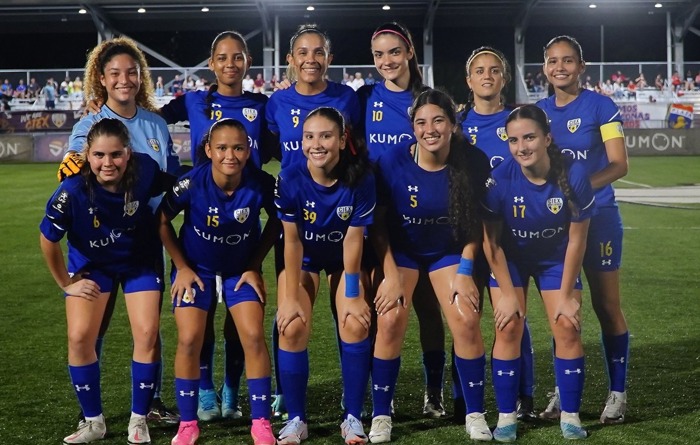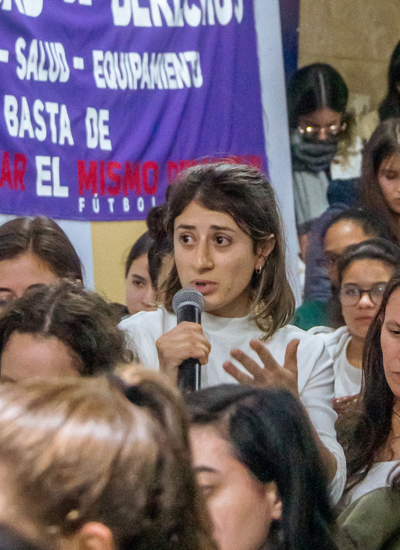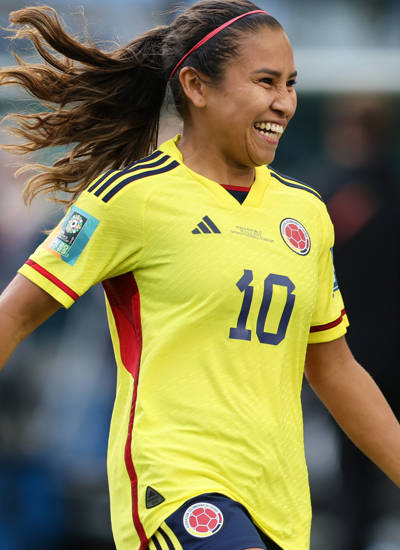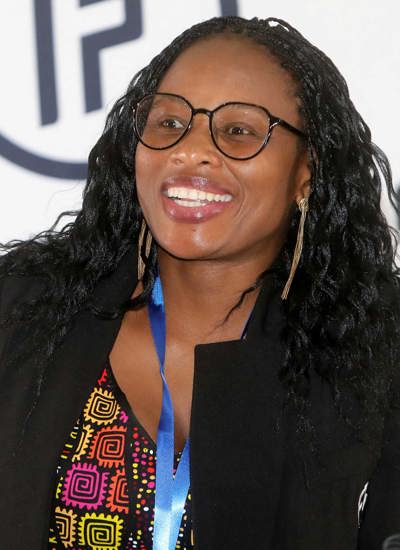
Amarelis de Mera (38) is a legendary figure in Panamanian women’s football. Known as La Bombardera, she made her debut in 1999 and has played in Spain, USA and Israel, as well as for various clubs in Panama. She has been running her own football academy for girls for ten years. Since 2022 she has been a member of the Executive Board of AFUTPA.
By Amarelis de Mera
My long career as a footballer is well known in Panama: my 22 goals for the national team, the titles I won with clubs here and abroad. What hardly anyone knew about was my health problem. I only went public with it at the beginning of this year when I was forced to ask for help to get an operation.
In 2004, when I was playing in Spain, I started to develop a blockage in my oesophagus. I had to chew everything thoroughly when eating, grind it into tiny pieces in my mouth. I couldn’t eat much solid food, for example, because it got stuck and no more could get through.
It was a very uncomfortable time, so I tried to eat at home as much as possible to have that comfort I needed. I wasn’t a normal person who can sit down and have a meal in a restaurant. I only did that with people who knew what was wrong with me, because we could be asking for the bill and I would still be eating! I went with family or friends who understood me.
I wasn’t eating properly, but even so I was able to perform well because I always tried to take great care over my diet. For example, before a match I always ate at home and then went to the stadium. But I was playing and couldn’t even have a drink of water to refresh myself! The doctor recommended drinking something fizzy, sparkling water or soft drinks, because the gas expanded my oesophagus area.
I used to have my fizzy drinks during matches, but I had to do it on the sly because people thought I was odd. How could I be drinking that? But very few knew about my condition, only those closest to me.

In the national team I sat at the table with those I knew best because sometimes my food got stuck and I had to run to the toilet to eject it. There was a coach in the national team who knew about my situation. He told me: “Take your food with you and finish it in your room so you’ll be comfortable.”
I should have had an operation, but I kept going for love of the sport. Back then it was a very invasive and risky operation and I didn’t want to lose playing time. I was working and I had work insurance, so I had all the tests done. But then there was a competition, then another, or I was picked for the national team. And there wasn’t enough recovery time, so I decided to put it off.
But the last few times I was called up to the national team was difficult, because the girls didn’t understand the issue. And it was frustrating because sometimes they all finished eating and I had to wait. I decided I couldn’t live like that any longer and had to have an operation.
At the beginning of this year, a doctor in a private clinic told me that there was no longer any need to operate and that they could fit me with a valve that when open would widen my oesophagus to the requisite degree. I paid for everything, had the tests done and got the valve fitted. It worked for a day. It never opened again and my situation got worse. The diameter of my oesophagus was like that of a telephone cable.
I had to start being fed through a nasal tube that went down to my stomach. I was on a liquid-only diet and my weight dropped drastically. I was just skin and bone, and I was weak. I needed surgery immediately, but although I was doing my personalised professional jobs in clubs and schools I don’t have a contract.

My operation was going to cost 40,000 dollars. My first reaction was “well, I’m going to die”. How was I going to get that kind of money? I’ve devoted my life to playing football. I’ve given up a lot of things for the sport because here either you work or you play. Either you study or you play. Few companies understand that you have to travel to play, but as a footballer you’re only paid the minimum and only when the league is running. It’s the same with medical insurance, and moreover it only covers injuries related to playing or training.
With Tauro, my club at the time, I wrote to Social Security but they never replied. The situation was desperate. That was when we started the public campaign together with AFUTPA, our players’ union, where I’m a representative for women’s football. We’ve been fighting for quite a while for these improvements in working conditions, and for men as well.
AFUTPA had some contacts and wrote a letter. My doctor signed another. I started tweeting about how delicate my state of health was. It became such a big media story that we got support from the government: first from the Secretariat for Women and then from the President’s Office.
When they called me to confirm the operation, I cried for about two hours. A month later — I had to gain weight because I was extremely thin — I had the surgery. I prepared myself psychologically because I was really scared. They had to break one of my ribs, which was terribly painful. After the operation, I started recovery on my own. I should have been in intensive care for seven days. I was there for two.

Today, seven months later, I’m excited to say that I’ve returned to football. A couple of weeks ago I made my debut for CIEX CF. I thought I was going to have to retire, but my recovery went very well. I joined the club as an administrator, and they suggested I should play in the LFF League. I’m very out of form but I’m gradually getting back into the game, so I’m very happy.
What happened to me was not at all easy; it was very tough. I hope I’ve struck a chord with all those who can do something to help bring about the improvements we need in our working conditions as footballers. It’s a job for everyone: government, federation, union, even private companies as well, because none of this would have happened if women’s players were insured, if we were paying contributions as we should be.
That’s what we’re fighting for, and my case gave us an even louder voice, because the whole of Panama heard about it. At AFUTPA we’re working so that those who come after us won’t have to go through what I did.


